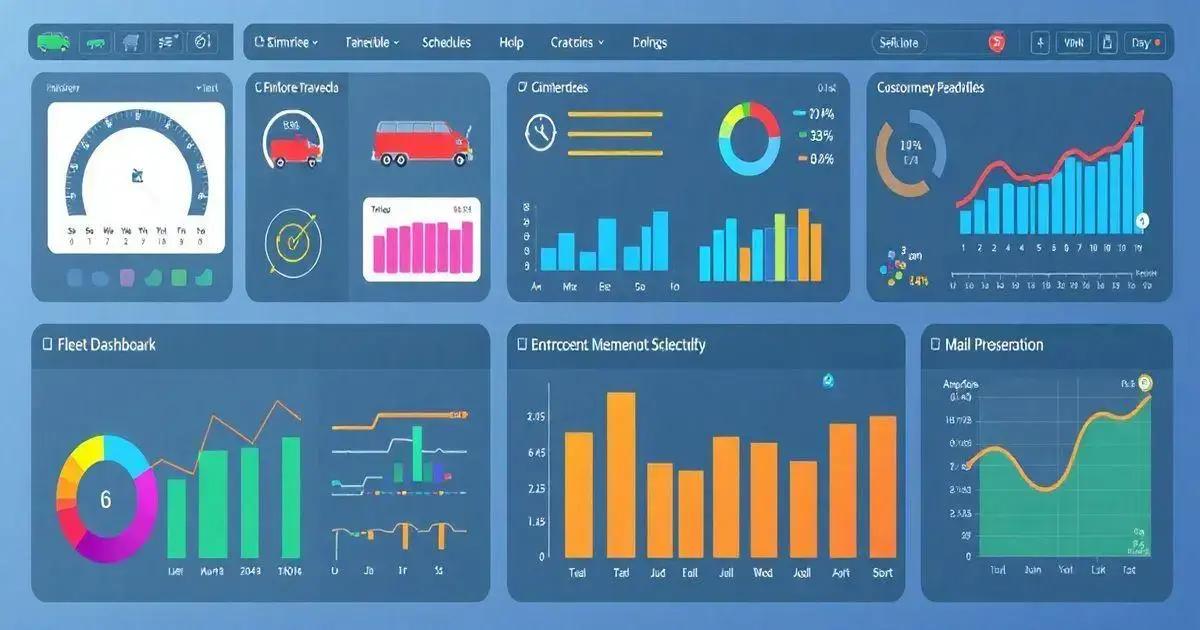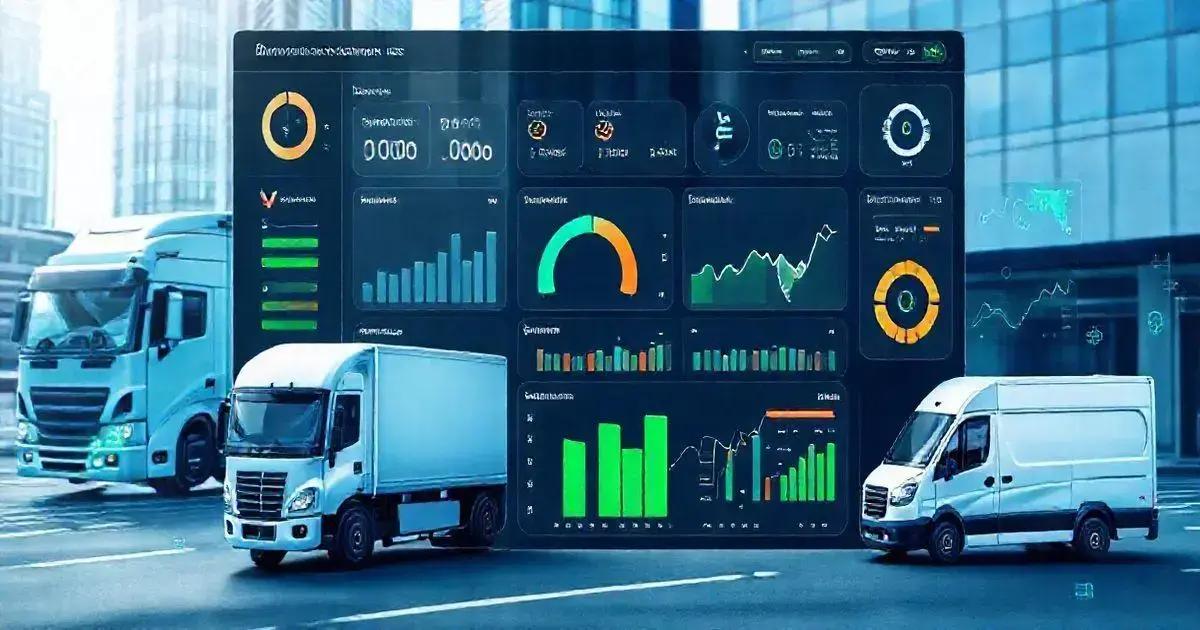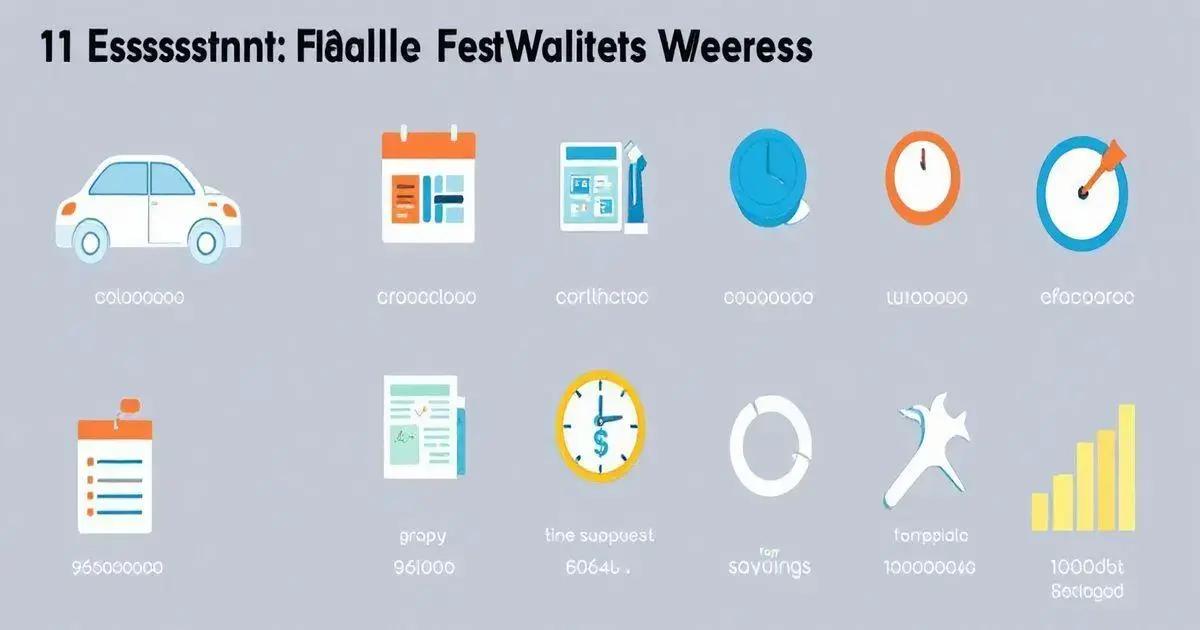10 Essential Features of Fleet Control Worksheet 7.0 Leave a comment
The Fleet Control Worksheet 7.0 is an essential tool for fleet managers, offering functionalities such as initial dashboards for performance insights, driver and vehicle registration management, document tracking for compliance, travel control for monitoring trips and expenses, and maintenance tracking to ensure vehicle longevity and operational efficiency.
The Fleet Control Worksheet 7.0 is a comprehensive tool designed to streamline your fleet management processes. With an array of essential features, this worksheet not only helps track kilometers per vehicle but also monitors maintenance schedules, fuel consumption, and much more. This article will delve into the ten essential features of the Fleet Control Worksheet 7.0, showcasing how it can make your fleet operations more efficient and cost-effective.
Initial Dashboards
The Fleet Control Worksheet 7.0 comes equipped with a variety of initial dashboards that provide critical insights into your fleet’s performance. Here’s a breakdown of the key components you’ll find:
Initial Dashboards
- KM by Driver: This dashboard allows you to track the total kilometers driven by each driver, providing a clear view of their usage and efficiency.
- KM per Vehicle: Monitor the distance traveled by each vehicle to assess their performance and identify any that may require maintenance or replacement.
- KM per Liter: This feature helps you analyze fuel efficiency by showing how many kilometers each vehicle travels per liter of fuel, crucial for managing fuel costs.
- KM per Trip: Evaluate the distance covered on each trip, which is essential for planning and optimizing routes.
- Average Consumption per Vehicle: This metric assists in understanding fuel consumption patterns across your fleet, helping to highlight any vehicles that are consuming more than expected.
- Average Consumption per Driver: Analyze how different driving styles impact fuel efficiency, allowing for tailored driver training if necessary.
- Total General, Preventive and Corrective Maintenance: Keep track of all maintenance activities, ensuring that vehicles remain in optimal condition.
- Maintenance Cost Average: This dashboard compiles the average costs associated with maintenance, aiding in budget planning.
- Total cost of Mechanical and Electrical Maintenance: Identify the expenses related to mechanical and electrical repairs, important for financial forecasting.
- Total Tire Maintenance Cost: Monitor how much is being spent on tire maintenance, a key factor in fleet management.
Each of these dashboards is designed to provide actionable insights, helping fleet managers make informed decisions to enhance operational efficiency and reduce costs.

Registrations
The Fleet Control Worksheet 7.0 features a robust registration system designed to keep all relevant information about drivers and vehicles organized and easily accessible. Here’s what you can manage through the registrations section:
Registrations
- Driver Registration: This allows you to input and manage detailed information on each driver, including their license details, contact information, and any certifications they might have.
- Vehicle Type Registration: Register different vehicle types in your fleet, including details such as make, model, year of manufacture, and specifications, enabling better tracking and management.
- Mechanical and Electrical Services Registry: Keep a comprehensive log of all mechanical and electrical services performed on each vehicle, which is essential for maintenance tracking.
- Tree Service Registration: This feature allows you to register all the tree services related to vehicle upkeep, ensuring that all aspects of vehicle maintenance are documented.
- Lubricant Services Register: Maintain records of all lubricant services carried out, which helps in monitoring when lubricants were last applied, ensuring vehicles operate smoothly.
- Register of Workshops and Suppliers: Keep an updated list of all workshops and suppliers used for maintenance and repairs, making it easy to manage relationships and track expenses.
- Expenditure Type Register: Log all types of expenditures related to fleet operations, allowing for detailed financial tracking and analysis.
- Refueling Station Registration: Document all refueling stations used, including their locations and pricing, helping in strategic planning for fuel purchases.
- Fuel Type Register: Manage different types of fuel used by your vehicles, facilitating better fuel management and cost analysis.
This registrations section is crucial for keeping all necessary data organized, allowing fleet managers to make well-informed decisions and maintain an efficient fleet.
Document Management
The Fleet Control Worksheet 7.0 includes a dedicated document management system that ensures all necessary documentation for drivers and vehicles is systematically organized. This functionality is vital for maintaining compliance and ensuring operational efficiency. Here’s what you can manage within the document management section:
Document Management Features
- Driver Document Control: This feature allows you to manage and track all essential documents for each driver, such as licenses, insurance papers, and certifications. This ensures that all driver-related documents are up-to-date and easily accessible.
- Vehicle Document Control: Similar to driver documents, this functionality helps you keep track of all important vehicle documents, including registration papers, insurance, and inspection certificates. Proper management of these documents is crucial for legal compliance and operational readiness.
By utilizing the document management capabilities of the Fleet Control Worksheet 7.0, fleet managers can ensure that all necessary documentation is maintained in an organized fashion, reducing the risk of non-compliance and improving overall fleet operations.

Travel Control
The Fleet Control Worksheet 7.0 provides an efficient travel control system that is essential for monitoring and managing all travel-related activities within your fleet. This feature enables fleet managers to track every aspect of travel, ensuring comprehensive oversight. Here’s what you can manage in the travel control section:
Travel Control
- Cargo Control Linked to Trips: This feature allows you to track cargo associated with each trip, ensuring that all loads are accurately documented and managed throughout their journey.
- Vehicle Control: Monitor the specific vehicles used for each trip, allowing for better resource allocation and route management.
- Driver Control: Keep track of which driver is assigned to each journey, ensuring accountability and enhancing safety measures.
- Supply Control: Manage the supplies needed for each trip, such as fuel and maintenance kits, ensuring that vehicles are well-equipped before departure.
- Control of All Travel Expenses: Log and analyze all costs associated with travel, from fuel expenses to tolls and maintenance, enabling better financial oversight and budget management.
The travel control section of the Fleet Control Worksheet 7.0 is designed to enhance operational efficiency by ensuring that all travel-related activities are carefully monitored and managed. This not only helps in maintaining accountability but also contributes to cost optimization across the entire fleet.
Maintenance Control
The Fleet Control Worksheet 7.0 features a comprehensive maintenance control system that is crucial for ensuring the longevity and efficiency of your fleet. Proper maintenance tracking not only minimizes downtime but also helps in managing costs effectively. Here’s what you can manage within the maintenance control section:
Maintenance Control
- Corrective and Preventive Maintenance Type: Keep a record of both corrective and preventive maintenance activities. This allows fleet managers to schedule regular check-ups and repairs to prevent breakdowns and prolong vehicle life.
- Maintenance by Vehicle: Track maintenance activities for each vehicle individually, providing insights into the specific needs and history of each unit within your fleet.
- Maintenance by Mechanical and Electrical Type, Tire and Lubricants: Categorize maintenance tasks based on different types such as mechanical, electrical, tire-related, and lubrication services. This organization helps in ensuring that all aspects of vehicle maintenance are covered.
- Maintenance Cost: Document and analyze the costs associated with all maintenance activities. Understanding these expenses is essential for budgeting and financial forecasting.
- Preventive Maintenance Schedule: Develop a schedule for preventive maintenance tasks, ensuring that all vehicles receive timely service based on their mileage or operational hours.
- Preventive Maintenance Signal: Implement alerts or signals for upcoming preventive maintenance tasks, helping to ensure that no important service is overlooked.
- Status by: Scheduled, Accomplished and Delayed: Keep track of the status of each maintenance task, categorizing them as scheduled, completed, or delayed. This ensures transparency and accountability within your maintenance operations.
By utilizing the maintenance control features in the Fleet Control Worksheet 7.0, fleet managers can maintain a high standard of vehicle care, thereby reducing the likelihood of unexpected repairs and increasing the efficiency of the fleet.
Conclusion
In summary, the Fleet Control Worksheet 7.0 is an invaluable tool for fleet managers seeking to enhance operational efficiency and manage their fleet effectively.
With carefully designed sections for initial dashboards, registrations, document management, travel control, and maintenance control, this worksheet provides comprehensive oversight of all aspects of fleet management.
By leveraging features such as detailed tracking of kilometers, thorough driver and vehicle registrations, organized document management, precise travel monitoring, and systematic maintenance scheduling, fleet managers can make informed decisions that contribute to cost savings, improved safety, and better resource utilization.
As the demands of the logistics industry continue to grow, utilizing a robust system like the Fleet Control Worksheet 7.0 is crucial for businesses wanting to stay competitive and ensure their fleet operates smoothly.
FAQ – Frequently Asked Questions about Fleet Control Worksheet 7.0
What features are included in the Fleet Control Worksheet 7.0?
The Fleet Control Worksheet 7.0 includes features for initial dashboards, driver and vehicle registrations, document management, travel control, and maintenance control.
How can I track maintenance for my fleet?
You can track maintenance through the Maintenance Control section, which allows you to document corrective and preventive maintenance, categorize tasks, and monitor costs.
Is there a way to manage fuel consumption?
Yes, the worksheet includes features to analyze fuel consumption per vehicle and calculate kilometers per liter, helping to optimize fuel usage.
Can I manage driver information with this worksheet?
Absolutely! The Driver Registration feature allows you to store and manage all relevant information about each driver, including licenses and certifications.
What benefits does the Travel Control section provide?
The Travel Control section helps you monitor cargo, vehicle assignments, driver controls, and all travel-related expenses, ensuring comprehensive oversight of your fleet’s journeys.
Is the Fleet Control Worksheet 7.0 suitable for all types of vehicles?
Yes, the worksheet can be adapted for use with various types of vehicles, making it versatile for different fleet management needs.

